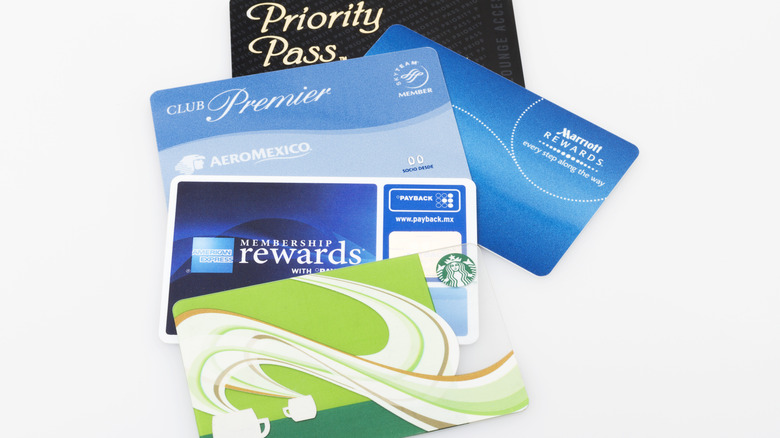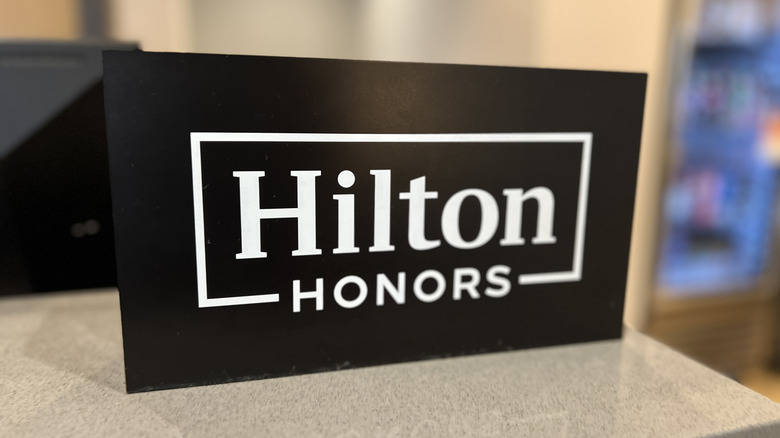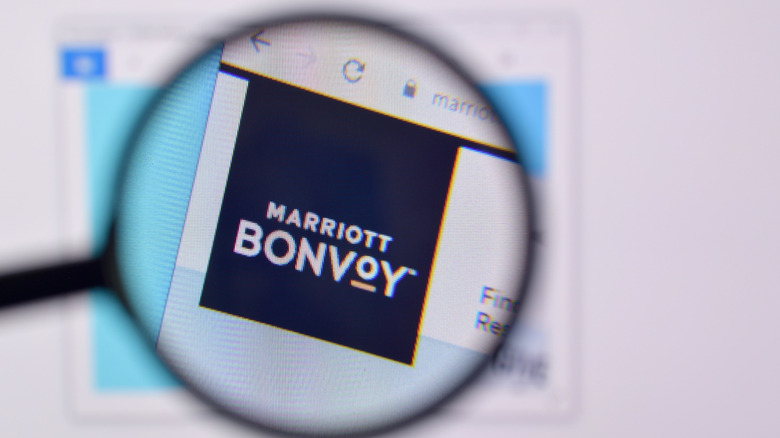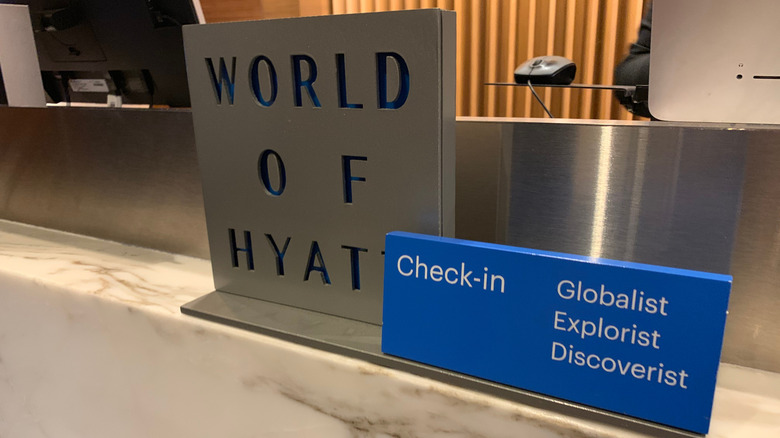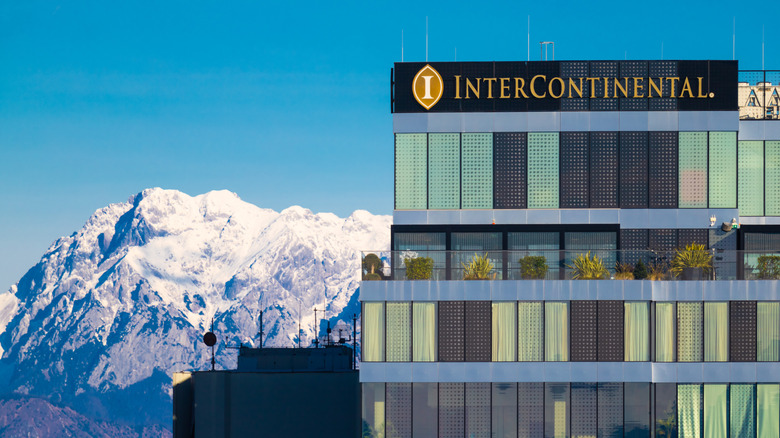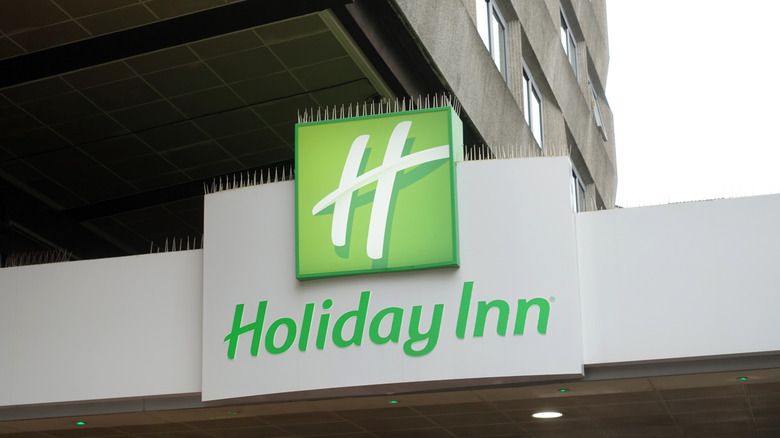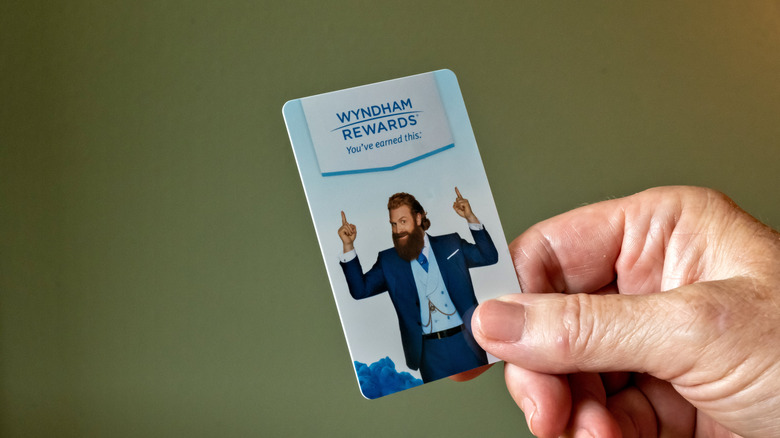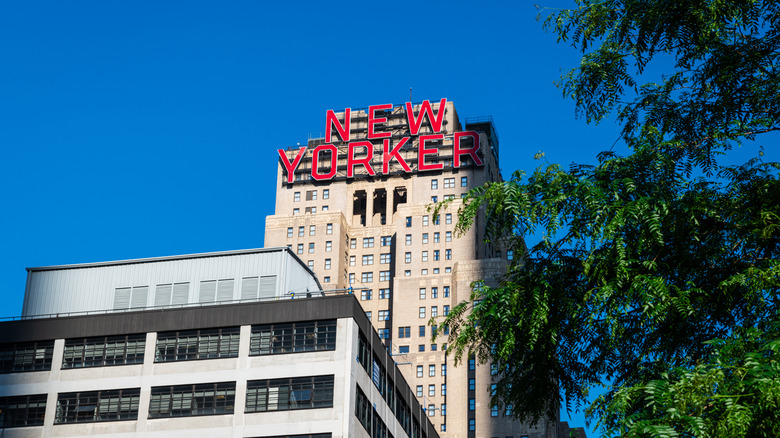5 Hotel Loyalty Programs That Are Actually Worth It
Hotel loyalty programs sell us the world. It's hard not to conjure dreams of waltzing through five-star lobbies to be welcomed (ahead of everyone else, of course) to an upgraded suite, a bottle of champagne in the room, and an array of other VIP add-ons. Unfortunately, the reality is far different.
That's not to say these programs can't be brilliant, but in this new world where the definition of loyalty has almost become a synonym for how much money you can spend, it's best to temper your expectations a little and hone in on programs that truly benefit you. The best programs elevate your experience in real ways, helping you feel respected as a customer and add tremendous value in the form of points redemptions and other money-saving perks. The worst hotel loyalty programs offer neither, effectively becoming a way to rope you into regular stays with little or nothing to show for it.
We've roped in Victoria Fricke, travel expert and owner of luxury travel agency Vic's Vacations, to lend her opinion on some loyalty programs that she feels are truly worth it, as well as what to look out for in any given system. We've also thrown in some more in-depth tips on these programs and highlighted the best ways to maximize them for your benefit.
What are hotel loyalty programs?
As Victoria Fricke states, loyalty programs are systems designed to "reward travelers for repetitive business". They reward customers in many ways, but, generally speaking, they do this by gifting them redeemable points and offering perks for elite members during a stay. Each program differs in the way it does, and no system is created equal.
Some place a heavy emphasis on the value of their points, while others focus on the experiential side of things, allowing the most valued customers to enjoy everything from room upgrades, executive suite access, free breakfasts or food credits, and flexible check-in and check-out times. Just be sure to reconsider certain luxury-seeming hotel freebies you might want to avoid. Used well, they're an incredible tool that can transform the way you travel, but there is a less beneficial side to it all.
It's vital to remember that, despite being suggested purely as a benefit to you, these are essentially marketing programs designed to keep customers tied to their brand. If you're a regular business traveler, the volume of points you can rack up, the regular upgrades, and the money-saving benefits will be huge for you. If you're not a business traveler and only use hotels a few times a year, be logical about how much you bind yourself to a brand.
What makes a good loyalty program?
The truth is that there's no single brand that beats the others. The best program is the one that suits you best. Victoria Fricke highlights a few things to look for, starting with accessibility. "If you live in a smaller city, you might have brands that aren't as popular globally – that limits you in your search to earn points and status." In short, if you can't use the brand enough, it's not a great option. She also notes that amenities should be top of the list when looking for a solid experiential program. For example, if "late check out is something you always want, you'll want to ensure the program you align with offers that with status".
Fricke also notes that the ease with which you can earn and redeem points is also vital. This is the truest way to gain value from a program, and if you're not being rewarded for your stay, it's not worth it. If you don't travel too often, these programs are going to have a minimal impact on your life. Credit cards (which we'll talk about later) have made it easy to grab elite status and earn tons of points, but you need to be careful you're not blowing hundreds of dollars on annual fees a year just to grab a free breakfast on the one stay you have.
How to join loyalty programs
The good news is that joining almost any loyalty program is completely free. Once joining, which typically involves a basic sign-up, you'll be enrolled in the lowest elite tier. This comes with basic perks, such as Wi-Fi or bottled water, and also triggers the ability to earn points on your stays.
Getting to the higher tiers requires a little more effort or money. For example, you may need to stay upwards of 60 nights in a single year, or hit thousands of dollars worth of spending. It's these tiers that boast the upgrades, late checkouts, and elevated experiences, but they come at a premium.
Nowadays, there are ways to circumvent this. Instead of staying the required nights, you can earn a co-branded credit card and automatically receive elite status. Usually, the ones offering high status have high annual fees, so you need to be wary about whether you're breaking even when it comes to value. These also come with introductory offers, offering high volumes of points for spending a certain amount within a specified timeframe.
Understanding hotel points
Points are an immensely misunderstood aspect of the travel industry. Many people who start trying to use them are immediately put off by the apparent lack of value they provide. Hotels often plug points as a way to enjoy free travel, and while this is true, it's not always as easy as it looks.
Hotel points are generally worth less than airline miles, although there are exceptions. Generally, you want to achieve at least $0.01 per point to make it a good redemption. The best airline points program scores well above that figure, but the average hotel point falls well under. Learning to use these in the right ways and opting for certain points over others is the best way to maximize them.
The main reason for the low value is due to the switch from award charts, where hotels set the points value for a stay in advance, to a dynamic system, where points fluctuate depending on several factors. Without the reliability of an award chart that may say a room costs 35,000 points a night, the same room could be 60,000 one day, 120,000 the next, before dropping back to 35,000. A good rule of thumb is to shoot for more than $0.01 per point. To work this out, divide the cash price of the room by the number of points, and then multiply by 100. For example, a room that costs $500 in cash or 60,000 points would give you a 0.83 cents per point value — not great.
Hilton Honors
Victoria Fricke's top pick was Hilton Honors. Noting its expansive footprint, there's a good chance the brand has a property somewhere near you, from elegant icons in Downtown Chicago to sweeping complexes in the Maldives. That presence makes it a strong pick for the average traveler, even someone who travels only a few times a year. With big names like Hampton Inn, DoubleTree, Garden Inn, and the flagship Hilton properties, you're spoiled for choice.
Just for joining Hilton Honors, you'll become eligible for late check-outs, which helps you avoid paying those sneaky resort fees and start earning points. Better yet, its entry-level tier (Silver) offers some solid perks with minimal effort — just four stays unlock this level. You can grab two bottles of water at check-in on every stay, you're eligible to use the "Fifth-Night Free" perk, and get a 20% bonus on your earned points. If you can work your way up to Diamond, you'll start seeing the epic room upgrades, executive lounge access, 48-hour room guarantees, and you can even gift Gold Status to a friend or family member after hitting 60 nights.
Hilton has co-branded cards that automatically gift you Diamond Status, but at $550, it's not cheap. It comes with a huge points bonus, a free award night, and on-site credits, so if you stay in Hilton properties more than a few times a year, you'll more than make your money back in savings, but for the casual traveler, it may not be worth it. It's also possible to earn Gold status by opening an American Express Platinum card.
How valuable are Hilton Honors Points?
Hilton Honors may lead the way experientially, but compared to some of its competitors, its points can be frustrating to maximize. This is mainly due to its temperamental dynamic pricing system. Luxury properties can often soar beyond 150,000 points a night, with even cheaper properties now regularly creeping above 60,000.
That's not to say it's not possible to find some great redemptions. Focusing on luxury properties and being flexible with dates to hone in on lower rates is essential for maximizing your points, as you'll typically get the most bang for your buck. Also using the "Fifth-Night Free" benefit, which, as the name suggests, gives members the fifth night in a points redemption free.
The good news is that Hilton Honors points are arguably the easiest to earn, its earning rates are great (especially with a co-branded card), and it's possible to transfer points from American Express, allowing you to move points when it makes sense. This accessibility, combined with the solid experiential value, makes Hilton Honors one of the best on the scene.
Marriott Bonvoy
Victoria Fricke also rates Marriott Bonvoy highly for many of the same reasons as Hilton. As "another with a great footprint across the world", it's easy to find a Marriott property almost anywhere. In fact. Marriott is the largest hotel brand on the planet, making it virtually unbeatable in that respect.
Its elite status benefits also work in a similar manner, but are only earned using nights instead of stays. You'll need to hit 10 nights in a calendar year to grab the 10% earning bonus, priority late checkout, and the Ultimate Reservation Guarantee. Gold is earned with 25 nights, while its top-tier, Ambassador Elite, requires a whopping 100 nights plus $23,000 in spending. That's a hefty undertaking, but it does offer a ton of high-end perks, from a personal concierge to elite status with other programs like United Airlines and Hertz.
Marriott also offers elite status via credit cards, with its highest-tier product offering Platinum status, and the American Express Platinum offering Gold status. Again, these are expensive products, so it's important to weigh out the pros and cons.
How valuable are Marriott Bonvoy Points?
Marriott Bonvoy also shares many similarities with Hilton in this respect. The brand operates a dynamic system with fluctuating rates across all its properties. With that said, it does generally offer slightly better rates than Hilton, making it a better option for those seeking true value.
It also operates a fifth-night benefit, helping its points stay competitive and pushing customers to book longer stays at its properties (after all, the longer they stay, the more they'll pay for other things). Yet again, it is best to redeem points on luxury stays, as these stretch the value of points further.
Earning rates are — as with other programs — increased as you progress through the elite tiers. But as a transfer partner of American Express (issuer of one of the best credit cards for travelers), moving points when it suits is a smart decision, rather than putting all your eggs in one hotel-shaped basket. A co-branded card can also offer a solid injection of up to 100,000 points, which could be immensely valuable.
World of Hyatt
Hyatt may not have the same global footprint as some of its competitors, but its loyalty program and points system make it one of the most valuable brands for customers. In fact, we could go as far as saying that, in terms of pure value, it is number one.
Its loyalty program is simpler than others, only offering three tiers beyond its basic membership. The lowest of these, Discoverist, only requires 10 nights in a year to earn, and, as Victoria Fricke notes, "you get daily bottled water and 2 p.m. late checkouts upon availability, which is great. Make your way to Globalist and you'll earn room upgrades, club lounge access with free breakfast, and even a 4 p.m. checkout!" That's an excellent array of perks for a fairly easy-to-achieve tier.
Of course, by committing fully to Hyatt's smaller roster of hotels, you are putting yourself at a higher risk of not having a property nearby. With that said, it has a presence in 78 countries, with brands like Park Hyatt, Grand Hyatt, and the Unbound Collection making any stay epic.
How valuable are World of Hyatt Points?
Hyatt's elite system is one thing. Its points system is another ball game altogether. At the moment, its points are the strongest in the market and should turn the heads of almost any traveler. If your goal is saving money, Hyatt is the only program you should be honing in on.
Its value stems from its award chart system — something the other brands have done away with. Instead of fluctuating rates, each hotel is assigned a category from one to eight. Within those categories, standard rooms and suites are priced for off-peak, regular, and peak dates. For example, a Category One hotel would cost 3,500, 5,000, or 6,500 points per night on an off-peak, regular, or peak date, respectively. Similarly, a Category Eight (high-end luxury) hotel would cost 35,000, 40,000, or 45,000 points. Considering that a night at a Category Eight could cost over $1,000 in cash, you're getting incredible value. Compare the rates of other brands' comparable products and you won't find anything close to this value.
IHG One
Despite having some brilliant brands under its name — like Kimpton, Holiday Inn, Hotel Indigo, and Intercontinental — IHG operates a little in the shadow of its competitors. Until the last few years, its loyalty program left a lot to be desired, but thankfully, it has changed all that now.
Its new IHG One program offers many of the usual bells and whistles, from free breakfasts, early check-ins, and elite status with partner organizations. The downside is that you don't really get access to many of them until you reach Gold, which requires 20 nights over a year. Another downside is that if you don't get to at least Silver, your points will eventually expire.
Victoria Fricke also says that "If you can make it to 20 nights at Gold Elite, your nights roll over to the following year towards next year's status," which gives you a huge leg up on keeping your status. The program offers some scope, but it's probably best for those who love the brands on offer, rather than those looking for a super-high-value loyalty experience.
How valuable are IHG One Points?
We're back to the dynamic systems with IHG One points. Instead of the trusty award chart offered with Hyatt, the points here fluctuate heavily based on demand, time of year, or whatever the powers that be decide is relevant. Generally speaking, IHG One rates are less valuable than Hilton and Marriott, too.
However, it does cover one cool feature that adds value with a little less effort than its competitors. Similar to the fifth-night-free benefit at other brands, IHG operates a fourth-night option. It's only a difference of one night, but it can go a long way, especially since IHG points aren't quite as valuable. Having a pool of them isn't a bad idea, but if saving is your goal, put some more emphasis on the high-value points found in other programs.
Wyndham Rewards
Wyndham is a bit of an outlier in the hotel points realm. It positions its properties outside the typical routes, choosing instead to hone in on smaller towns and convenient roadside locations in the U.S. Victoria Fricke says that "Wyndham is a great program for those who find themselves on road trips on a budget with hotels like Travelodge, Days Inn, Laquinta, and Ramada". But its global reach is surprisingly big, too. With over 9,000 properties worldwide, you have more options than you may be aware of.
Wyndham's loyalty program is a simple setup, with just three tiers above its basic membership. The easiest to grab is Gold, and it only takes five nights to earn. Platinum and Diamond take 15 and 40, respectively. With arguably the most accessible elite tiers on the market, it's understandable that the perks aren't spectacular. You do get late checkout, early check-in, a Caesar's Reward Match, and even the ability to gift Gold, spread across the tiers, but the real value lies in the increased points earning opportunities.
How valuable are Wyndham Rewards points?
Wyndham's points are sneaky valuable and, just like Hyatt, this is owing to its award chart, which predetermines rates for all its rooms. Amazingly, all of its properties are placed into three categories. These cost 7,500, 15,000, or 30,000 points a night, respectively. Simply choose the category that works for you, and away you go.
That set-in-stone value is brilliant because you know how far your points are going in any given situation. There's no wrestling to find a good deal or fighting to find flexibility, as a night costs what it costs. This sort of simplicity is surprisingly rare in the hotel points world. If you stay in Wyndham properties regularly, it's well worth building a store of points. Capital One and Citi both allow transfer to Wyndham, too, just in case you don't want to commit to one system.
Methodology
Victoria Fricke provided fantastic insight and shared her opinion on multiple hotel programs, offering expert insight into the experiential aspects of each. From there, each section was enhanced with extra information from the writer's own experience and the websites of all the hotel programs involved. The author of the article is also an experienced points and miles expert, with over four years of industry-centered work on the subject, running a branded points and miles newsletter, and writing over 500 articles on the subject.




